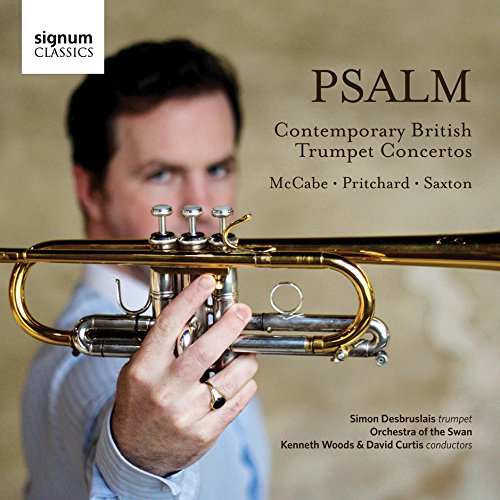Robert Saxton’s 1992 trumpet concerto, “Psalm- A Song of Ascents” must be one of the most intense 19 minutes in music history.
Described, with charming self-deprecation, by its composer as “a semi-impossible” piece, it is a dramatic masterwork that pushes soloist, conductor, orchestra and audience to their very limits.
The writing ranges from the unison E that opens the work through some of the thorniest harmonic writing you’re ever likely to hear, to a coda of breathtaking beauty in A major.
When we took the stage to perform it on Friday with my colleagues from the Orchestra of the Swan, and trumpet soloist Simon Desbruslais, I think I can honestly say that nobody was too focused on the nuances of Robert’s harmonic language.
I think we were most concerned with avoiding a train-wreck.
Granted, we’d just recorded the work for Signum, but it had not been feasible to run the entire work during the sessions or the dress rehearsal. The trumpet writing demands staggering virtuosity and super-human endurance, the fiendishly difficult orchestral music is full of rhythmic challenges and traps, and the conductor needs to keep a network of dozens of tempos and tempo relationships, ebbs and flows, firmly under control while navigating a stormy sea of polyrhythms.
Could we manage it?
Well, sometimes a bit of existential fear is just the thing.
Once we got going, it started to feel like we actually knew the piece, and the performance began to take off. How Simon found the chops to rip into the cadenza as he did after 2 days of recording, I will never know. As the piece reached it’s final pages, I wasn’t the only one in the building thinking “holy crap, this is a masterpiece.” I heard the same thing from a number of other players and composers present at the interval. Finally, we reached the coda, with its strangely desolate chords, then the final codetta, where the orchestra finally comes together on a huge, fortissimo “A” unison, then blossoms, gently into a sustained A major, over which Saxton poses the question “A or E-flat” over and over again.
Then, silence.
I took a moment to savor that feeling of being punched the stomach by a piece in a good way, lowered my arms, then realized I was grinning broadly. I looked over and Simon was, too. I think we were both pleasantly shocked at how well it had gone, and completely shaken by the piece. I looked to my left and caught the eye of an older lady with tears streaming down her face. A friend of the orchestra who comes to most of their concerts told me at the intermission that she felt like she couldn’t breathe for about a minute. Despite the challenge, despite the difficulty, despite the intensity, everyone seemed to love it, everyone seemed to get it.
And then, at the interval, another friend told me that as I dropped my hands and the audience started to applaud, the gentleman behind him let out a long sigh and said, rather loudly, “thank God that’s over!”
And who was my friend who overheard this strongly expressed minority opinion?
Robert Saxton himself, of course.
Really, who would be a composer?
So, please remember: you never know who you’re sitting next to in life.

Awesome story. Can’t wait to hear the recording.
Cheers, Erik. It’s a rad piece- they’re all very interesting and effective, but Robert’s has the most musical chest hair, if you know what I mean…..